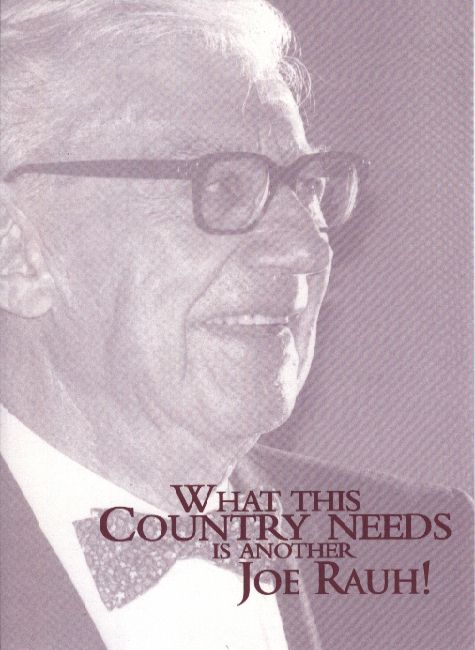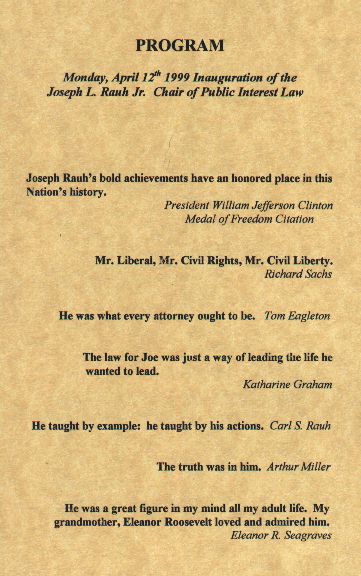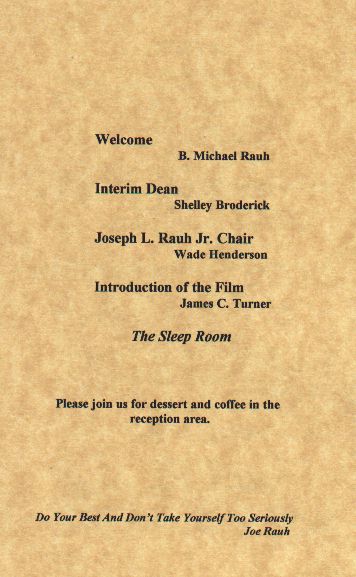



Every day I draw a breath, I miss Joe Rauh. Tonight you are going to see
some of the reasons why.
Joe may not have invented public interest law, but he certainly perfected it.
The film you are about to see, The Sleep Room, is based on Joe's last great public
interest case -- a suit against the CIA on behalf of a group of unsuspecting
Canadians who were used as guinea pigs in CIA-funded brainwashing experiments
at a Montreal psychiatric hospital.
The Sleep Room is not a documentary or a history of this case; it is a drama.
Many characters are composites and I am actually portrayed as a woman, the
character Jane Conroy. She's a lot prettier than I am. Tonight we are screening a
shortened version of the film that summarizes the events of the 1950s, and focuses
on what happened here in Washington during the 1980s. Let me give you some
background on this story.
At the height of 1950s Cold War hysteria, the CIA feared that U.S. airmen in
Korea had been "brainwashed" to make false confessions. The Agency
responded by launching a Top Secret program called MKULTRA to test
psychedelic drugs and other techniques of controlling human behavior.
With the blessing of CIA Chief Richard Helms, MKULTRA Director Sidney
Gottlieb embarked upon a series of reckless and unethical experiments --
conducting LSD tests by slipping the drug to unsuspecting people. In one 1953
CIA drug test, the results were disastrous, with the human guinea pig, Dr. Frank
Olson, falling to his death from the 10th floor of a New York City Hotel -- events
which are today the subject of a reopened homicide investigation by Manhattan
District Attorney Robert Morgenthau.
The Canadians Joe and I represented were all patients of a Montreal
psychiatrist, Ewen Cameron, during the late 1950s. Using CIA money, Cameron
tried to literally "brainwash" his patients --
No one knows how many hundreds of patients were abused in these CIA
experiments, but the people we represented had their health devastated and their
lives shattered by these bizarre experiments -- all conducted without any patient
knowledge or consent in violation of the code for medical ethics our country
enforced at the Nuremburg War Crime Trials.
Joe was outraged at this story of how the CIA abused its power to conduct
secret operations, and believed that accountability for this misconduct was critical.
In a word, this was a public interest fight for the principle that no part of our
government is above the law. We also believed that reasserting this principle was
especially important in the 1980s with the emergence of an increasingly out-of-control CIA led by its then Director, William Casey.
The Sleep Room captures the essence of a public interest fight, as well as Joe
Rauh's personal humanity to all those who knew and worked with him. It also
documents Joe's incredible determination and fortitude -- for those of us who
knew and worked with him have no doubt that the CIA's decade long strategy of
litigation by attrition cost Joe his health and ultimately shortened his life.
Ten years ago Joe and I wrote an article about this public interest case against the CIA, which concluded with these words:
"A public interest litigation is a special kind of struggle with heavy burdens, but even greater satisfactions. Where else can a lawyer interrogate a former CIA Director one day and draft questions for a Member of Parliament the next? To us it seems that public interest lawyers enjoy the lion's share of the satisfactions in our profession."An integrated life where one's professional activities are an extension of the same ethical and moral principles that shape one's private relations is too often dismissed as unattainable in the 'real world.' We don't know of anyone who can work harder or enjoy greater satisfactions in the practice of law than a lawyer whose cases are an extension of personal principles and commitments."
Every day I draw a breath, I miss Joe Rauh. After tonight, you will, too. Ladies and gentlemen, The Sleep Room.